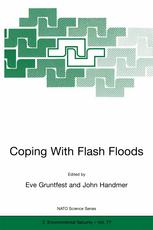

Most ebook files are in PDF format, so you can easily read them using various software such as Foxit Reader or directly on the Google Chrome browser.
Some ebook files are released by publishers in other formats such as .awz, .mobi, .epub, .fb2, etc. You may need to install specific software to read these formats on mobile/PC, such as Calibre.
Please read the tutorial at this link: https://ebookbell.com/faq
We offer FREE conversion to the popular formats you request; however, this may take some time. Therefore, right after payment, please email us, and we will try to provide the service as quickly as possible.
For some exceptional file formats or broken links (if any), please refrain from opening any disputes. Instead, email us first, and we will try to assist within a maximum of 6 hours.
EbookBell Team

4.3
88 reviewsThis volume is the proceedings of a NATO-sponsored Advanced Study Institute (ASI) entitled "Coping with Flash Floods" held in Ravello, Italy on 8-17 November 1999. Thirty-five participants from nine countries attended the ASI, representing both developed (United States, England, Italy, and Mexico) and developing (Poland, Uganda, Greece, Ukraine, and Slovenia) countries. Participants from a variety of professions and disciplines were involved including a hydraulics engineering professor from Slovenia, four members from the Polish Institute of Meteorology and Water Management, and a U. S. Geological Survey research hydrologist from Puerto Rico. Although the ASI was officially composed of lecturers and students, these roles were blurred as each person shared information and ideas, and learned from the other participants during the 10 days. One of the highlights of the ASI was the collaborative effort of participants from different countries and disciplines. It was particularly extraordinary that the two engineers from Greece made the most passionate pleas for long term sustainable solutions to flash floods. A further example is that while there were only three participants with social science backgrounds, most of the recommendations focus on the policy and societal priorities, more than the engineering, hydrologic or meteorologic efforts.